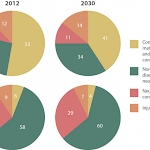
Opinion
Promoting women in science in Latin America and the Caribbean
If Maria Emilia is a Latin American scientist, half of her colleagues are probably also women, but her chance of being admitted to the National Academy or National Agency is much lower than for her male colleagues. What are the main challanges women in science face in Latin America and the Caribbean? And what policies would (or should) support them?
1 October 2018

Opinion
A Gaming Revolution for International Development
There are more than one billion people living under $1.25 a day and almost the same number playing at least one hour of video games worldwide. So, how can the popularity of games be harnessed for positive social change?
21 March 2017

The Gathering Storm
A rights-based approach to protecting victims of climate-induced displacement is needed; one which recognises entitlement to assistance and protection, and leverages opportunities for safe and dignified migration.
15 May 2015

Ebola: 38 years, 25 outbreaks
While forming a key component of the recent Ebola response, much debate surrounds how clinical trials testing new experimental treatments for the disease should be designed.
26 March 2015

Donated Drugs Against Neglected Tropical Diseases
One in six of the world’s population live in rural areas, and suffer from poor health - especially chronic diseases caused by infection with parasitic diseases now known as ‘Neglected Tropical Diseases’ or NTDs.
1 June 2014

Curiosity Seeks Clues to Past Life on Mars
Well over 3.5 billion years ago when liquid water was present on Mars, it may have harboured primitive microbial-like life. If humans are ever to travel to Mars, the availability of resources will play a crucial part in the planning of such missions.
1 October 2013

Global Mental Health
For global health to truly deliver the overarching aim of health equality for all, it must overcome the artificial dualism separating mental from physical illness
1 May 2012

Opinion
Accra Invaded
High rates of urbanisation and population growth has led to housing and infrastructural incapacity in Ghana, threatening the country's economic success story.
1 January 2012






